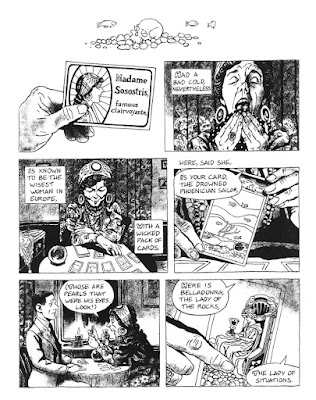 |
| One page from the comic book |
Who would have imagined that T S Eliot’s convoluted
poem, The Waste
Land, would one day be a comic book? I was fascinated when I came
to know about it from an article
in Open Culture. The sample pages reproduced in the article look
charming too.
My first association with The
Waste Land was as a postgraduate student of English literature. The
imageries and motifs of the poem caught my fancy. But I’m not sure I understood
its deep intricacies. The sluggish resistance to life in the opening lines
shakes your very roots, “stirring dull roots with spring rain.” We don’t want
to be reborn. We are happy with our hibernation. It’s a sort of spiritual
hibernation. We need a reawakening. That’s what the poem is leading you to.
Eliot was shaken by the
disillusionment that descended on the world after the World War I. There was untold
devastation which went on to exert profound impact on society, culture, and
art. The war shattered the belief in progress, rationality, and the values of
the 19th century. A sense of despair and hopelessness prevailed now.
The cultural and spiritual vacuum prompted Eliot to explore themes of decay,
fragmentation, and the loss of meaning. The Waste Land was the result.
The poem is divided into five
sections. The motif of death and rebirth foreshadows the disillusionment and
decay that will make their presence throughout the poem. There is a spiritual
drought for which people seek shortcut solutions like Tarot cards. The ancient
grandeur makes its appearance now and then in such forms as Cleopatra’s
burnished throne only to highlight the contrast between the genuine commitments
of the past and the emptiness of the present relationships.
The need for a spiritual revival is
accentuated in the middle section of the poem bringing Lord Buddha and Saint
Augustine into it. The title of the third section is ‘The Fire Sermon.’ Lord
Buddha delivered that sermon in which the senses and the world are mentioned as
being ‘on fire’ with desire, greed, hatred, and ignorance. We need to rise
above these passions through detachment and renunciation. Saint Augustine’s
answer to the fires that burned within him was to seek the redeeming grace of
his God, Jesus. His heart was restless until it found its rest in Jesus. Divine
grace or renunciation.
We need to dive into that ocean of
grace or renunciation in order to redeem ourselves from the fragmentation,
superficiality, and disillusionments of the present. We need to die,
metaphorically. Spiritually, if you prefer.
The poem ends on a note of hope
taking a message from the Brihadaranyaka Upanishad. The gods, the humans, and
the demons approach Prajapati, the creator god seeking a lesson on how to live
virtuously. Prajapati’s answer is Da which is interpreted variously by each of
the groups as:
1. Datta [give]: be
charitable and selfless.
2. Dayadhvam: be
compassionate
3. Damyata: control yourself
Magnanimity, compassion and
self-control are Eliot’s prescription for human salvation.
We have come a whole century from the
writing of The Waste Land. The world is entirely different today from
what it was back then in 1921 when Eliot wrote this poem. I wonder what Eliot
will exhort the people today.
It is good, anyway, that somebody
thought of bringing this poem back to today’s generation in the form of a comic
book, though there is nothing comic about it at all. Maybe Madame Sosostris will
entertain today’s young readers with her “wicked pack of cards.”
Related Post: Do I Dare?
Hari Om
ReplyDeleteThe world may be different, but the nature of mankind is not. This is why the philosophies of ancient times are as pertinent now as ever. Thanks for bringing this work to attention -not one with which I am familiar. YAM xx
True, human nature hasn't changed. The same old struggles go on. That's why probably the solutions too won't change really!
DeletePerhaps rather than "comic book" you should see it as "graphic poem".
ReplyDeleteI agree, comic book is a misnomer.
DeleteGreat to know about graphic comic book The Waste Land. Loved this post.
ReplyDelete